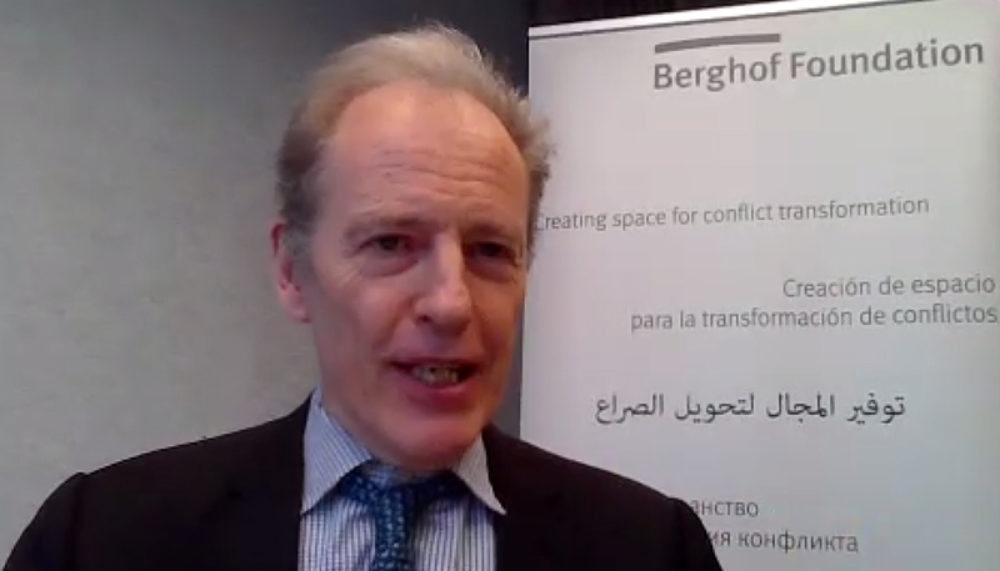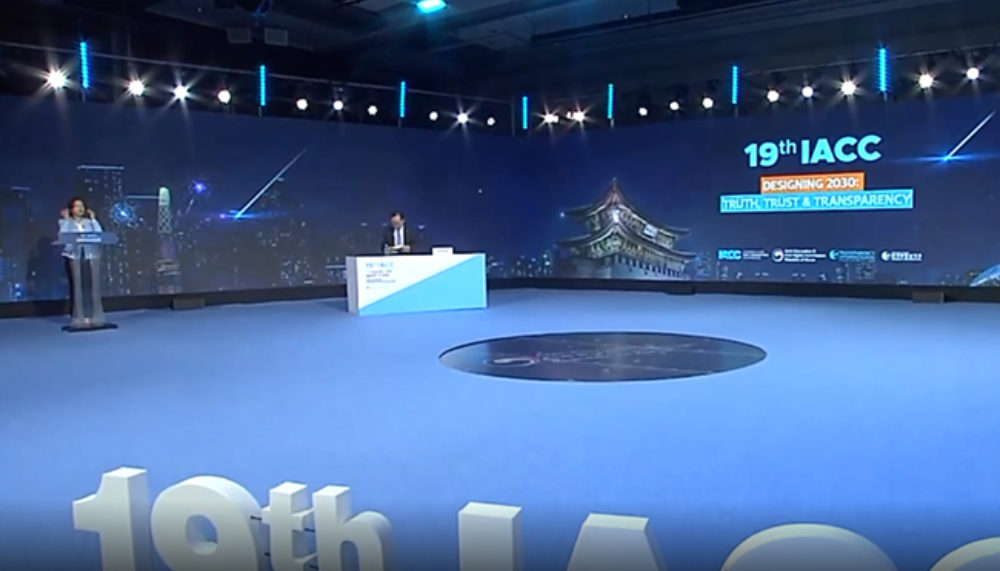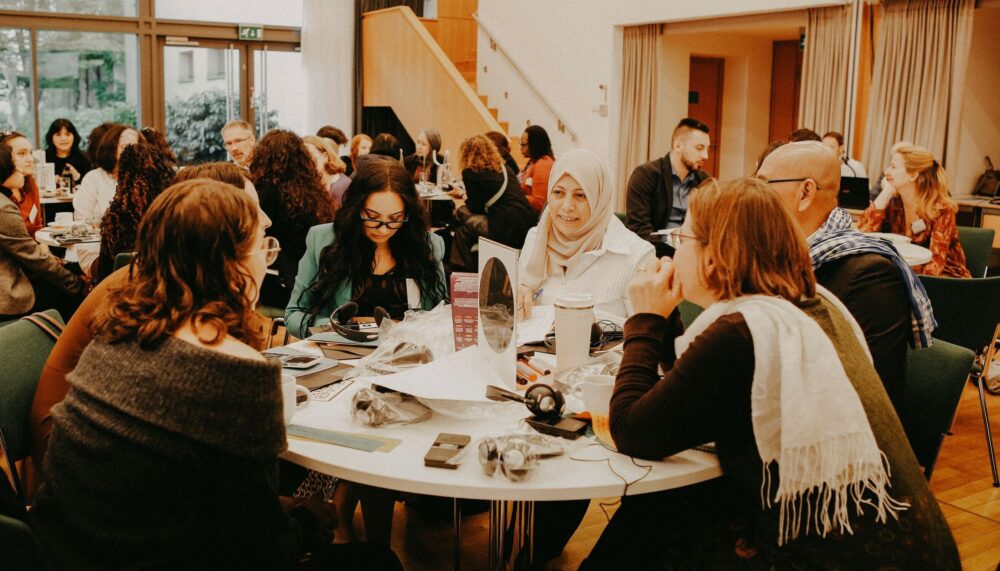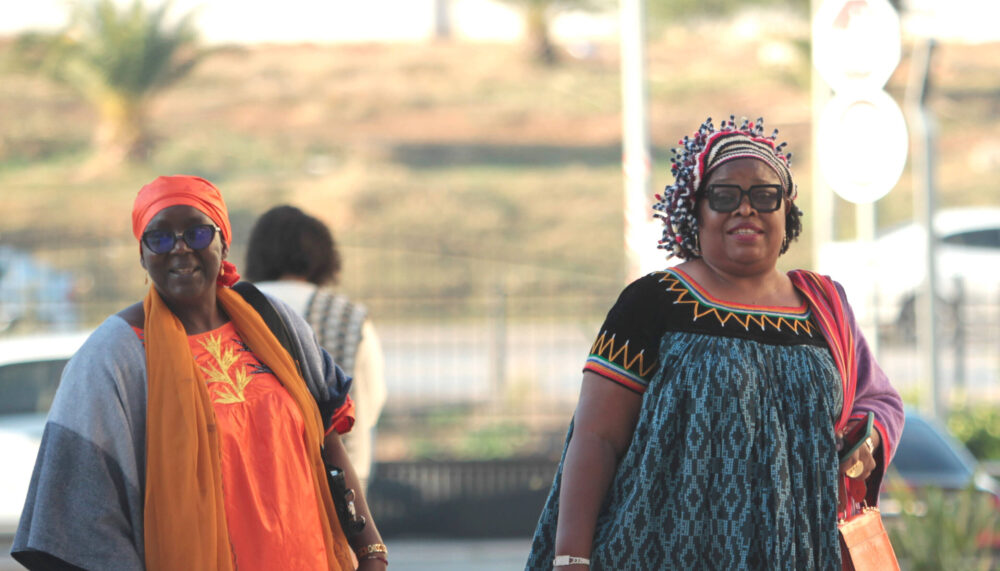FEATURE | 3 Dec 2020
Collective action for trust and integrity
International Anti-Corruption Conference: Opening statement by Andrew Gilmour, Executive Director of Berghof Foundation

A major challenge for us all is the linkage of corruption to so many of the world’s problems, combined with most people’s lack of awareness of these linkages.
As prepared for delivery, International Anti-Corruption Conference, 3 December 2020
What is the problem?
A major challenge for us all is the inextricable linkage of corruption to so many of the world’s problems, combined with most people’s lack of awareness of these linkages – and therefore, the unlinked way that we deal with these problems.
I think it is absolutely not a coincidence that often it’s exactly the same people who bear a lot of responsibility for a number of different global problems.
After all, politicians who we know are guilty of corruption – in all its many guises – are often: climate change deniers; people who downplay the importance of COVID-19; authoritarian populists; leaders who undermine vital national institutions for democracy, rule of law, freedom of press, and human rights; hate-mongers who whip up xenophobic feelings and hatred of minorities; nationalists who excoriate the multilateral institutions that were set up to deal with our common global threats. I don’t need to point out which departing world leader most obviously encapsulates all of those characteristics.

The fact that NGOs and activists involved on so many fronts are confronted by common enemies should surely mean – though regrettably it often does not – that there ought to be a common front of resistance to those enemies.
A second challenge relates to the enabling of such people. Corruption is a means that enables such leaders to carry out the other parts of their agenda. But in some cases it is also their goal as well; because of course it is corruption when the organs of state are mis-used to bolster the personal rule and finances of one family.
And it is another form of corruption when news organisations exacerbate the huge problems we face by knowingly peddling false facts about, say, climate change or COVID or the family of a political opponent or electoral results or judicial proceedings. It is corruption, and should be recognised as such, whether the motive of the news organisations in question – Murdoch-owned ones, QAnon and others – is to help corrupt leaders they like, or merely to increase ratings. Whether they actively seek to undermine trust in democratic, equitable and transparent public institutions, or whether they simply don’t care that this is what they are doing, is to some extent immaterial. The result is an almost global undermining of trust in institutions that has reached levels not seen at any period in our lifetimes.
Accompanying this trend to undermine public trust (as well as both a goal at times, and also an effect) is the undermining of NGOs. In the last 8 years or so, well over 100 countries have sought to pass laws and regulations putting limitations on civil society – those that are pro-human rights, pro-democracy, pro-environment, and pro-transparency.
It is not a coincidence that the major conflicts of the world which give rise to the most violent extremist movements – the Sahel region, Somalia, Yemen, Afghanistan, Syria-Iraq – are those where corruption is especially rampant and where the effects of climate change (above all drought) are particularly acute.
Corruption – and the resentments of those who suffer as a result – is a major driver of conflict. Similarly, conflict leads to corruption...
Many people during this conference have rightly highlighted the links between corruption and conflict. These are undeniable. Corruption – and the resentments of those who suffer as a result (economically and politically through exclusion and unfairness) – is a major driver of conflict. Similarly, conflict leads to corruption, because war economies are based on utterly corrupt practices, and the desire to enrich oneself through conflict (and the economic conditions that accompany conflict) often contributes to the motivation to keep fighting. We saw that in the wars of the former Yugoslavia in the 1990s, Colombia, Liberia, and now Somalia, Libya and many other places.
What needs to change?
The mediation and peacebuilding community (that Berghof is part of) in general tends to take the view – understandably but sometimes wrongly – that there is nothing more important than peace, because you cannot (in the absence of peace) advance on development, human rights, anti-corruption, climate change or whatever. Therefore, the thinking goes, anything that might upset the parties to conflict, or even distract them, thereby making them less amenable to making peace, has to be avoided. What this means is that there is an in-built temptation to focus on the short-term, to remove whatever obstacles there might be to warlords making peace.
And it is why peace-makers and mediator can sometimes get a bit irritated with the human rights community, or the anti-corruption community, or the climate change community, or the gender community, and lead them to say in effect, “of course your issues are important but for God’s sake be real, we have to focus on stopping this wretched conflict and if you push your issues then you will delay our peace-making issues and then your agenda will suffer too.”
Of course I get that line of thinking. There is a lot to it after all. The trouble is that many of those same issues – the human rights abuses, the corruption, the climate change – are all drivers of conflict. And if you want to address conflict in a way that leads to sustainable peace, then you have to address those issues too – and not just kick those balls into the long grass and hope they will be dealt with at some later point in time.
"In order to address conflict in a way that leads to sustainable peace, we have to address issues like corruption as well. We at Berghof are trying to bring topics like climate change and corruption into our actions for peace“, @_AGilmour at #IACC2020. #anticorruption pic.twitter.com/8tWpgPXdML
— Berghof Foundation (@BerghofFnd) December 3, 2020
What we are doing at Berghof is trying to bring in some of those tricky, sensitive, issues that are so interlinked with conflict into our own peacebuilding activities. This applies especially to climate change and to corruption – which we have decided to put at the forefront of some of our activities in the coming years. On corruption, we plan to focus more on supporting inclusive governance and accountability, and thus help to re-create trust in the state and its institutions in places like Yemen and Somalia.
We are also working to bring together the peacebuilding community and the anti-corruption community. For both side to see issues through more than their current single-focus lens. For the anti-corruption community to see how anti-corruption can contribute to peace processes, and why it’s important to avoid insensitively-applied anti-corruption measures that might destabilise fragile post-conflict situations. And for the peacebuilding community to recognise more than they currently do that anti-corruption approaches should be better integrated into peace processes and transitions, if there is any hope for a truly sustainable peace.
But it’s not just a question of NGOs who almost invariably focus on one sector or field (HR, peace, climate, aid, health etc.) needing to come together to work across separate silos. The donor community has to do the same. Those governments that are donors for peacebuilding, are also the most insistent on the need to combat both climate change and corruption. There are not that many of them but since they fund all these activities, you might expect them to be able to – to want to – insist on everyone working across the silos. But the truth is that many donor governments also work in silos – even within their development funding agencies. So NGOs talk to one department about peace, but are then told they can’t bring in corruption to a proposal because that’s funded by a different department. Same with climate change. Same with disinformation, hate speech, artificial intelligence. Which means that the signal to civil society can be interpreted as “keep working in your silos”.
At times it feels that those who are at the forefront of undermining transparency, the environment, democracy, human rights, rule of law, tolerance, multilateral institutions seem to have an advantage over the rest of us, seeing as they are usually the same people or else operate more effectively in supporting one another.
On the other hand, those of us – whether NGOs or donors – seem stuck in our respective silos, arguing about whether there’s a need to work outside and across them, but stymied by way sub-optimal bureaucratic procedures.
What we need to do is change our way of working. We in the peacebuilding community have to see more clearly the link between our work and corruption. And those in the anti-corruption community have to do more to consider how their activities can help or hinder the goal of peace. Let us all try to intensify this crucial dialogue, that has begun but is still only in its infancy.
Media contact
You can reach the press team at:
+49 (0) 177 7052758
email hidden; JavaScript is required


